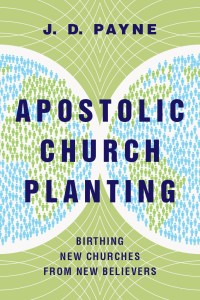Payne, J. D. Apostolic Church Planting: Birthing New Churches from New Believers. Downers Grove, Ill.: InterVarsity, 2015. Link to IVP
Apostolic Church Planting is a follow-up to Payne’s Discovering Church Planting (InterVarsity, 2009). At one-quarter of the length of his earlier work, Apostolic Church Planting is intended to answer some questions which in the years since the larger book was published. Payne has a website with church planting and missions resources.

Using Barnabas as a model (ch. 3), Payne describes the ideal team member who will evangelize in a community and begin to disciple those who accept Christ. From this group of growing believers, the planting team should identify and appoint elders and pastors for that local community (outlined in ch. 5 and 6). Payne identifies a series of roles in a newly planted church: learner, explorer, evangelist, teacher, developer, and mentor/partner (ch. 6). Since the team is making disciples rather than planting a church, the goal is to move newly saved people through these discipleship levels and eventually move the mentor/partner out into a new community to begin the process again (see the chart on page 78).
With respect to methods, Payne explains church planting methods ought to be biblical, reproducible, ethical, avoiding paternalism (especially important in a cross-cultural context), and manifest Christ-sustained abilities (ch. 8). He offers a chapter encouraging church planting in “hard soil,” or places which seem resistant to the Gospel, balancing a communities need and receptivity (94). This is an encouraging sentiment given that most church plants succeed in the affluent suburbs or in inner-cities with support from affluent churches in the suburbs.
He concludes the book with a chapter on spiritual guidelines and ethical guidelines for church planting (chs. 11-12). Some of these guidelines concern the relationship of the team and their support, but most (even the ethical guidelines) are based on team members who are growing spiritual and committed to creating disciples.
Throughout the book Payne uses a “question and answer” model to deal with potential objections (or obvious questions). Each chapter ends with brief summaries and a short bibliography will help readers to find additional resources for church planting (including three additional books by J. D. Payne).
Conclusion. Payne is a pastor of multiplication at The Church at Brooks Hill, Birmingham, Alabama and has been involved in evangelism and missions within a Southern Baptist context. I am not a church planter, so I will not comment too much on his methods. I do balk at the title since it implies the early church planted churches using the method in this book. This is not the case at all! We really have no access to how the Twelve planted churches; in fact, we do not really know that they did “plant churches” in the modern sense of the word. In some cases Paul entered a Jewish synagogue, preached the Gospel and caused a riot which resulted in a “synagogue split.” Paul then developed believers who left the synagogue into a church. I doubt any church planters would use the method Paul used in Thessalonica or Corinth as an ideal method. Perhaps I am being overly academic, but as helpful as Payne’s book is, I think calling it “apostolic” is a bit of a stretch.
The book offers both spiritual and rational advice and encouragement for what sorts of things need to be in place for a church to grow once it is planted. Payne breaks with some of the more corporate methods used by mega-churches which turn church plants into franchises, or “satellites” orbiting a central church (and usually a central personality by broadcasting sermons in real time from the superstar preacher). Payne’s book is right to focus on making disciples and raising up leaders from within the community God has gathered together.
NB: Thanks to Intervarsity Press for kindly providing me with a review copy of this book. This did not influence my thoughts regarding the work.
